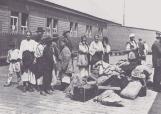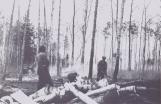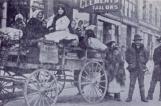1
Domka Zahara tells how her family settled in Canada in the 1890s, and about their first experiences as new immigrants.I come from the village of Brodky in Bukovyna Province. My maiden name was Domka (Domina) Roshko. My parents were peasants. My father died when I was quite small and my mother married again to a widower from the neighbouring village of Mytky, where we went to live. My stepfather had five children from his previous marriage and my mother had two. Five more children were born to them so there were really three groups of children. Not all of them survived; some died in Canada. I didn't go to school in the old country because I wasn't quite eight years old when we went to Canada in 1900.
It was in July that we went to Chernivtsi, from there to Hamburg and then to Liverpool, where we waited three days for the boat. It was a large freighter. The emigrants slept in a large hall fitted with two tiers of bunks. It took us ten days to cross the Atlantic. The people aboard ship came from the villages of Mytkiv, Bridok, Kadovbyschi and Verenchanka. All were from Bukovyna without exception. We arrived in Quebec City. Some people stopped off there because they didn't have the means to proceed any farther, but our family continued on to Winnipeg. We were met by Kyrylo Genyk in Quebec City. He was very helpful and gave us some lectures on life in Canada.
When we came to Selkirk, Manitoba, where there were some large buildings in which immigrants were temporarily housed, Kyrylo Genyk told us not to go to Gardenton because the land was poor there, but advised us to go to Sakatchewan or Alberta instead. He wanted our people to do well. But my stepfather didn't take his advice because he had a brother in Stuartburn, which was near Gardenton. He insisted that he was entitled to 160 acres of land and that he was going to have them. He took out a homestead, but the land was no good. It was stony and some of it was swampy. The mosquitoes were very troublesome.
When we got to Gardenton, we stopped at John Kovaliuk's, who was my stepfather's brother. He had a cabin consisting of two small rooms. We were crowded and found it quite unpleasant. We were very glad when my stepfather bought a cow because now we would have our own supply of milk. We stayed there for six weeks. Then we moved in with our cousin, William Roshko, where we lived until autumn. My stepfather went to work threshing. He earned an ox in payment and bought another one for cash. Then he bought a wagon and a sleigh. Thus we had our own means of transportation.
We took out a homestead some five miles from the cousin's place. We felled some trees that winter and built our house in the spring. We moved into it in July. This was in 1901.
We had built our house of logs, plastered the outside walls with clay and thatched the roof with some grass that we had cut. The clay plaster and the grass thatching dried and then shrank; then it began raining one night. The ceiling became soaked and clay started dropping on us. Our mother kept moving us from one corner of the cabin to another. On top of that, the door and windows hadn't been installed as yet. My mother covered the open door and windows with pieces of coarse carpet. And it rained for almost three days on end. When the weather cleared, we plastered and thatched all over again. We lived in this cabin for twelve years.
I didn't go to school because it was three miles away and hard to get to, especially in winter when the roads were drifted over with snow. It was impossible to get to school when the weather got warm because it turned swampy all over. Besides, school wasn't compulsory in those days and our parents preferred to keep us home to help with the farm work. There was no time to study. For that reason, no one in our family went to school.
My stepfather cut down the trees on the homestead and the children gathered the branches into piles, which we burned, and that was how we cleared the land. Whenever a new building was put up, we helped our mother mix the clay with which the walls were plastered. My stepfather sowed a few acres with wheat and rye which he threshed with a flail during the winter. The boys were still small. We girls had to look after the cattle. We didn't have proper stockings or mitts, so we practically froze when the weather was very cold. It is enough to compare conditions then with conditions today to realize how terrible things were for the early settlers. We children didn't understand very much, but our mother cried and cried and cursed our unenviable lot. She missed the old country and her relatives very much.
My mother didn't sell her land in the village of Brodky in Bukovyna until four years after she had gone to Canada. She received seven hundred dollars for it which was a good deal of money at that time. Both my brother and I got our share because we had been orphaned. A fine house still remained in the village, as well as some land. Our money (my brother's and mine) remained in the bank because our stepfather wasn't allowed to withdraw it since it belonged to the orphans. My brother was eight years older than I. When he reached the legal age of twenty-four, he sold his share of the land. I, on the other hand, lost my money during the war because it had remained in the bank. Only in 1926 did I sell my land for 260 dollars. Then my mother, my stepfather and brother died and, since no provision had been made on their part, I didn't get the inheritance that was my due.
I spent twelve years in Stuartburn. People from both Bukovyna and Galicia lived there, the former on one side of the river and the latter on the other side. Each group had its own church because the people from Galicia were Uniates (Roman Catholics) and those from Bukovyna were Orthodox.
The people generally congregated on Sundays by their respective churches. I had to walk seven miles to get to church. It used to be that in the spring I would carry my shoes slung over my shoulder and walk barefoot all the way there because it was swampy all around. I would only put on my shoes when I came near the church.
In winter, the young men, who had come from the old country and were working on the railroad extra gangs and doing section work, stayed in the homes of our people in Gardenton. They lived up to ten and more to a room. They bought and butchered a heifer or steer for meat and baked their own bread. Sometimes they held dances, usually on Sunday afternoons. They rented the largest room for ten dollars for their dances. Dancing wasn't permitted during Lent. Then the young men came to the girls' homes and held evening gatherings and everybody sang. It was a happy life.
I married in 1912. My husband bought a farm in partnership with two other young men. The land was stony and covered with trees. The three of them cut cordwood which they sold. My husband built a house that was a little better than the one that my parents lived in. He worked wherever he could find employment, at rich farmers' places, where he cleared the land of trees. We had two cows which I tended, and a pair of oxen. He cut cordwood which he hauled with the oxen for sale in town.
We already had seven acres of land under cultivation. We kept a fine garden in which we grew many onions for sale. People used to ship whole carloads of onions in those days. They also sold cream and butter. And they dug seneca roots which they sold in town. That was how we lived.
My husband went to the Peace River District in 1915 where he already had two children. We travelled from Gardenton to Edmonton and from there to Grand Prairie. We got on the train at six o'clock in the evening on Monday and arrived in Spirit River at one o'clock in the morning on Wednesday. That is how long it used to take trains in those days. The railroad had been built the previous fall. There had been heavy snowfalls that winter, so the grades were washed away in some places with the coming of the spring thaw. Our train had to stop from time to time in order to allow the conductors to walk in front and see that the rails and ties were firmly in place. The train would move on a bit if everything was all right. Sometimes repairs had to be made to the railroad and we would be held up for longer periods of time.
Since it was so late when we arrived in Spirit River, we decided to spend the rest of the night at the local hotel. When we entered, we saw some men sleeping along the walls of the lobby. These were, in the main, young men who were evading the military draft and had come here looking for homesteads.
My husband told me to stay at the hotel, saying that he would walk nine miles to the homestead. He would return in the morning and take us to my brother's place who had already built a small house of his own. I didn't know what to do or where I would keep our small children in the meantime. The owner of the hotel brought a bed of sorts and placed it in one corner of the lobby. I put the children to sleep on this bed, while I myself sat up all night. I was afraid to lie down in the midst of so many strangers.
My husband borrowed a pair of horses from a neighbour and came to pick us up in the morning. He took us to my brother-in-law's place where we stayed for six weeks. Living there was very difficult - my brother and his wife had two children, we also had two children, and a man named Muzyka, who had come from Calgary, had one child with him. All of us lived in one room.
My husband went to Grand Prairie where he bought a pair of oxen, a cow, a piglet, a plough and a wagon. With this, we began to farm in the new district. We were short of money because we had sold our farm in Gardenton for very little. My brother lent us some money and we began building our own house. My husband picked up some logs here and there, put them together and covered the roof with thatch. This was in May. My husband's brother brought our homemade stove and the heifer from Gardenton. He and his family moved in with us. When a snowstorm blew up, the wind howled through our house because there were still no door or windows put in. The children came down with the measles. My sister-in-law and I cried in our misery.
My husband hitched the oxen to the wagon and went to Spirit River where he bought some boards on credit. Out of these he made a door and the window shutters. We were a little more comfortable with the door and windows closed. But we were still living in a room that was empty, without even a table or any beds. My cousin, who was still single, brought us a bed of sorts which was still frozen over with snow. Another neighbour, also a single man, brought us a small table and a couple of chairs. Another man, who had come from our village, made us a stool. And so we were able to manage. My brother and his family lived with us for six weeks until they built their own shack that fall. My husband went to work on the railroad. Later, he bought some boards with the money he had earned and put in a floor.
Seventeen Ukrainian families were living in this district. They were all young people. Our farm of 113 acres extended to the edge of the Spirit River. The land was only fairly good. Because we were late in coming to the district, the land that we got wasn't as good as that of some other people who had acquired farms near Grand Prairie, Sexsmith and Fairview. It was the English people who had bought up the better farms. The Ukrainians settled on less productive land near Rycroft. However, this farm was better than the one we had owned in Gardenton where there were so many stones. Our farm in Rycroft was mainly prairie with a few trees. It was easier for us to clear some of the land and begin cultivation almost at once.
My husband ploughed a piece of land and I put in a garden. We also sowed some oats to provide feed for the chickens, but an August frost killed everything. I didn't wait for my husband to come back, but ploughed the land myself so that it would be ready for sowing the following spring.
Our third child was born on October 5, 1916. There was neither a doctor nor a midwife to assist me; only my sister-in-law attended to my needs. When I regained my health after giving birth, I built an addition to the barn. We had bought another cow and the chickens had to be put someplace. My husband worked at a farm where he was paid at the rate of a chicken a day for his work. I already had two brood hens. It wasn't long before I had sixty-five chickens.
Once, when I opened the door to the coop, I saw that there were only two or three chickens left. I fainted away on seeing this. That had been all the wealth that I had ever possessed. There simply was no trace of the chickens that had vanished. It occurred to me that someone must have stolen them. As it turned out, a fox had gotten into the barn and carried off the chickens. I certainly didn't get rich.
The year 1917 turned out to be somewhat better for us. We hoped that we would improve our condition before long, but another early frost killed everything in the field. Once again we were left with almost nothing. Our life on the new farm hadn't turned out so well.
2
A group of Ukrainian immigrants wait for their train to the WestApril 1896
 Credits:
Credits:National Archives of Canada
3
The first task of pioneers was clearing the land for a house, and then a farm1896-1914
Sifton, Manitoba, Canada
 Credits:
Credits:Manitoba Archives
4
Ukrainian Immigrants leaving Winnipeg for their homestead somewhere in Manitoba1898
Manitoba, Canada
 Credits:
Credits:Manitoba Archives